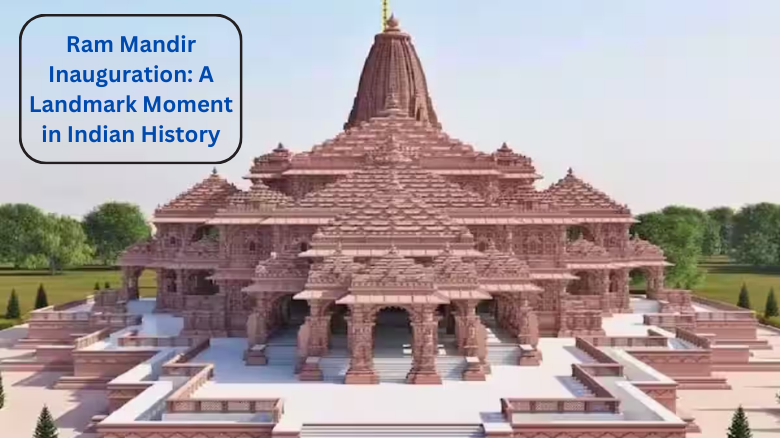Introduction:
Vikas the Concept School takes immense pride in acknowledging its students and parents about the historic inauguration of the Ram Mandir. This momentous event not only marks the culmination of a long-standing struggle but also signifies the cultural and religious ethos of India. Understanding the history behind the Ram Mandir and its significance is imperative to appreciate its role in shaping Indian society and history.
The Ram Mandir, situated in Ayodhya, holds deep-rooted significance in Hindu mythology and culture. It stands as a symbol of reverence and devotion to Lord Ram, one of the most revered deities in Hinduism. The journey toward the construction of the Ram Mandir has been fraught with controversy and legal battles spanning several decades. However, the recent inauguration of the temple marks a watershed moment in Indian history, signifying the triumph of faith and unity.
Historical Context:
To comprehend the significance of the Ram Mandir inauguration, it is crucial to delve into the historical context surrounding its construction. The dispute over the site of the temple dates back to the 16th century when the Mughal emperor Babur built a mosque, known as the Babri Masjid, at the site believed to be the birthplace of Lord Ram. Over the centuries, the dispute intensified, leading to communal tensions and legal battles.
The turning point in the Ram Mandir saga came in 1992 when the Babri Masjid was demolished by a mob, triggering widespread riots and communal unrest across the country. Subsequently, legal battles ensued, with various stakeholders laying claim to the site. After years of litigation, the permission for the construction of the Ram Mandir in Ayodhya was granted by the Supreme Court of India. In a landmark verdict On November 9, 2019, the Supreme Court rendered a verdict favoring the construction of a Ram Mandir at the contested site, alongside allocating a distinct plot of land for the construction of a mosque. This decision came after years of legal battles and deliberation over the ownership of the site, ultimately providing the necessary authorization for the construction of the temple.
Key Architect of the Construction:
One of the key figures responsible for the construction of the Ram Mandir is Shri Nritya Gopal Das, the president of the Shri Ram Janmabhoomi Teerth Kshetra Trust. His unwavering dedication and leadership played a pivotal role in mobilizing resources and garnering support for the construction project. Under his guidance, the Trust worked tirelessly to ensure the timely completion of the temple, fulfilling the aspirations of millions of devotees worldwide.
Ram Mandir Inauguration: A Landmark Moment in Indian History
Following the Supreme Court's verdict, the groundbreaking ceremony for the construction of the Ram Mandir took place on August 5, 2020, with Prime Minister Narendra Modi laying the foundation stone. The ceremony was attended by various religious leaders and dignitaries, marking a historic moment in India's socio-religious landscape.
The temple's design draws inspiration from traditional Indian architecture, particularly the Nagara style of temple architecture prevalent in North India. It features intricate carvings and sculptures depicting scenes from the Ramayana, the epic story of Lord Ram's life.
The inauguration of the Ram Mandir took place on August 5, 2022, coinciding with the festival of Ram Navami, which celebrates Lord Ram's birth. The event was attended by prominent political figures, religious leaders, and millions of devotees from across India and around the world.
The completion and inauguration of the Ram Mandir mark the fulfillment of a long-cherished dream for many Hindus and symbolize the assertion of their religious identity. It also signifies a significant milestone in India's history, emphasizing the importance of religious harmony and respect for diverse beliefs while also addressing longstanding grievances and disputes.
Significance of the Inauguration:
The inauguration of the Ram Mandir holds immense significance on multiple fronts. Firstly, it represents the fulfillment of a long-cherished dream of millions of Hindus across the world. For generations, Hindus have revered Ayodhya as the birthplace of Lord Ram and have aspired for the construction of a grand temple at the site. The realization of this dream has instilled a sense of pride and jubilation among devotees, reaffirming their faith and devotion.
Secondly, the inauguration of the Ram Mandir embodies the spirit of inclusivity and unity. Despite the contentious nature of the dispute, the construction of the temple has brought people from diverse backgrounds together in a spirit of harmony and brotherhood. The government's commitment to the construction of both the temple and the mosque reflects India's secular ethos and commitment to religious tolerance.
Furthermore, the Ram Mandir inauguration holds symbolic significance in the realm of politics and governance. It represents a triumph of the rule of law and constitutional principles. The resolution of the Ram Mandir dispute through legal means underscores the strength of India's democratic institutions and the judiciary's commitment to upholding justice and fairness.
The Idol of Lord Ram:
The central feature of the Ram Mandir is the idol of Lord Ram, sculpted by renowned artisans under the supervision of skilled craftsmen. The idol depicts Lord Ram in his divine form, adorned with royal attire and divine ornaments. His countenance exudes serenity and grace, reflecting the embodiment of virtue and righteousness. The idol's features are intricately carved, capturing the essence of Lord Ram's divine personality and eternal presence.
Conclusion:
In conclusion, the inauguration of the Ram Mandir marks a historic milestone in Indian history, symbolizing the triumph of faith, unity, and justice. The construction of the temple not only fulfills the aspirations of millions of Hindus but also embodies the secular ethos and pluralistic values of India. As we celebrate this momentous occasion, let us strive to uphold the ideals of tolerance, harmony, and inclusivity that the Ram Mandir represents. May the Ram Mandir serve as a beacon of hope and inspiration for generations to come, guiding us toward a future of peace, prosperity, and spiritual enlightenment.
Vikas the Concept School's Commitment to Indian Culture and Traditions in Education:
At Vikas the Concept School, the educational approach goes beyond academic excellence, aiming to cultivate well-rounded individuals who are deeply rooted in Indian culture and traditions. One of the core principles of teaching at Vikas the Concept School is to instill in children a profound understanding and appreciation of Indian heritage from an early age. Through a holistic curriculum, students not only excel in academics but also engage in activities and learning experiences that foster a strong connection to their cultural identity. The school recognizes the importance of preserving and passing on India's rich cultural heritage to future generations, ensuring that children are equipped with the knowledge, values, and traditions that form the foundation of their identity. By incorporating Indian culture and traditions into various aspects of the curriculum, such as language studies, arts, music, dance, and festivals, Vikas the Concept School creates an immersive learning environment where students develop a deep sense of pride and belonging. Through experiential learning opportunities, field trips, and interactive sessions with cultural experts, children are encouraged to explore, question, and embrace the diverse tapestry of Indian heritage. The school's vision is to nurture every child into a masterpiece, not just academically but also as an individual who is culturally aware, socially responsible, and globally minded. By embracing and celebrating Indian culture and traditions, Vikas the Concept School aims to empower students to become confident, compassionate, and culturally sensitive leaders who can contribute positively to society and shape a brighter future for themselves and generations to come.
Join Vikas the Concept School today and embark on a journey of academic excellence infused with rich Indian culture and traditions. Let your child become a masterpiece, equipped with knowledge, values, and skills to thrive in a diverse world. Visit our website https://www.vikasconcept.com/ and enroll now and shape a brighter future together with us!















